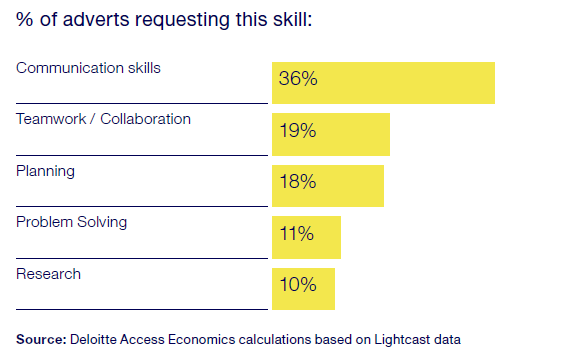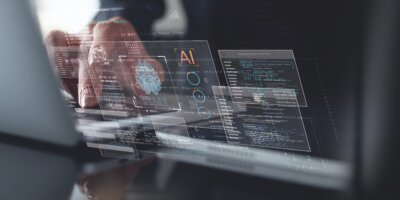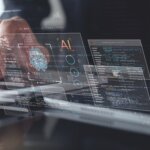
Why Australians aren’t buying in the generative AI hype (Source – RMIT Online)
Aussies don’t believe in the generative AI hype?
- Many Australians remain skeptical about the effects of generative AI on their careers.
- A significant gap in areas like generative AI and cybersecurity poses challenges for employers and employees alike.
- Australian businesses and the workforce must adapt to the evolving digital landscape through strategic training and the development of new skills.
Generative AI’s marketing narrative has caught everyone’s attention, heralding a new era where it reshapes business strategies, particularly in learning and development. This comes at a critical juncture, where acquiring digital skills is beneficial and essential for businesses and their workforce. However, a recent study has highlighted a surprising trend: many Australians seem to underestimate the impact this technology could have on their professional lives.
A collaborative study conducted by RMIT Online and Deloitte Access Economics has shed light on an alarming gap in Australians’ understanding of generative AI’s potential to disrupt existing job roles. This lack of awareness is especially concerning, given the rapid pace of digital transformation across industries.
The skills gap in digital competencies among both employers and employees is becoming increasingly apparent. Employers have noted a particular shortage in digital skills within their organizations, with a significant emphasis on generative AI, machine learning, data science, coding, and cybersecurity. This scarcity has led businesses to offer a considerable premium for these in-demand skills. Meanwhile, employees have acknowledged an even more acute shortage of digital skills, exacerbating fears about future job security in the face of emerging technologies.
Generative AI in the workplace: Use and relevance
This growing demand for digital skills underscores the urgency with which the Australian economy needs to address these skill shortages. Reports by Deloitte and the Australian Computer Society (ACS) project that an additional 1.3 million digital skills will be required by 2030 to keep pace with AI and data analytics advancements. This necessity is mirrored in the workforce’s sentiment, where most recognize the looming integration of technologies like generative AI into their daily tasks.
Despite the clear trajectory towards a more digitally integrated workplace, nearly half of the employees surveyed admit to having never used generative AI in their current roles, often citing its perceived irrelevance to their work. This viewpoint starkly contrasts with studies indicating that most occupations will eventually interact with these technologies. Employees do recognize the importance of digital literacy for their future success, although they underestimate the value of specific skills like data science and analytics.
The report reiterates the disconnect between employees’ current use of generative AI and their understanding of its relevance, despite widespread indications of its impending impact across various occupations. Furthermore, Deloitte’s research reveals that a mere fraction of Australian businesses feel fully equipped to adopt and utilize AI technologies effectively.
With digital skills in high demand, businesses are prepared to offer premiums for candidates proficient in data and digital competencies. This readiness highlights the critical skill gap in the Australian workforce, further magnified by the advent of AI and other pivotal technologies. RMIT Online’s CEO, Nic Cola, stresses the importance of proactive reskilling and upskilling to navigate the challenges posed by these technological shifts.
Echoing the need for a swift response to the evolving digital landscape, John O’Mahony of Deloitte Access Economics points out the unique advantages of generative AI in enhancing traditional learning and development. Its capability to produce customized content can significantly boost employee learning efficiency and knowledge retention.
Facing the future: The urgent need for strategic workforce development
Despite these insights, many employers have yet to introduce generative AI training within their organizations, underscoring a broader unawareness or hesitancy towards embracing these technologies. This reluctance occurs even as specific industries are poised for rapid and profound changes due to this revolutionary technology, emphasizing the critical need for a strategic approach to workforce development in the face of digital transformation.
Generative AI stands out from prior technological advancements with its ability to process vast amounts of unstructured data, eliminating a significant hurdle for business adoption. Its capability to generate new, multimodal content from straightforward user prompts opens up intelligence use to a wider audience, without requiring a background in computer science.
Currently, a mere 5% of Australian businesses are completely ready to integrate and utilize AI in their workflows. However, a substantial portion of the workforce and student body—32% of employees and 58% of students—already engage with generative AI, pushing its adoption across various sectors.
The main economic advantage of generative AI lies in its ability to enhance productivity by automating mundane and labor-intensive tasks. According to Deloitte’s survey on generative AI, regular users of these tools can save an average of 5.3 hours weekly. Those equipped with the skills to effectively employ the technology are at the forefront of these productivity improvements, with 59% of employees planning to enhance their generative AI skills within the following year.
Towards a generative AI-ready Australia: Bridging the training gap
However, there’s a noticeable disparity between employees’ enthusiasm to learn about generative AI and businesses’ investment in training and adopting these tools. 78% of companies surveyed have not offered generative AI training, or are unaware of such initiatives within their organizations. Additionally, 17% do not foresee providing training on generative AI at any point.
This gap in training exacerbates potential risks associated with generative AI, such as data breaches, inaccuracies, and copyright issues, with 53% of employees expressing concerns over privacy when using the technology in their roles.
Nevertheless, investment in AI by Australian companies is expected to surge to AU$27.5 billion by 2030, a seven-fold increase. This investment aims to maximize generative AI’s benefits by training employees on tailored models that securely and responsibly incorporate the company’s data. It also seeks to enhance workplace training and experiences through AI, thereby attracting and retaining employees adept in generative AI technologies.
Generative AI’s impact on skill demand varies across roles and industries, depending on how it’s applied. For instance, generative AI could affect 98% of sales tasks but only 3% of finance-related tasks in the retail industry. In cases where generative AI augments tasks rather than fully automating them, employees with basic technical skills, like coding and prompt design, can significantly benefit.
Five key industries—financial services, ICT and media, professional services, education, and wholesale trade—are poised for rapid and transformative changes due to generative AI, representing 26% of the Australian economy or nearly AU$600 billion in economic activity.
Although coding has been a highly sought-after skill in Australia for the past decade, the rise of no-code generative AI tools is making programming skills more accessible to the broader workforce. This shift underscores the growing importance of soft skills, such as critical thinking, problem-solving, and communication, alongside technical abilities.

Top five in-demand skills for professionals from January to July 2023 (Source – RMIT Online)
Generative AI is also expected to generate new job roles, especially in managing customized AI models, necessitating specialized data skills. The demand for professionals capable of designing AI models, monitoring outputs, and ensuring training data is diverse and balanced is set to rise sharply. Projections from Deloitte and the ACS anticipate a 179% increase in demand for advanced data analytics skills and a 268% surge in high-performance computing skills by 2030.
READ MORE
- Safer Automation: How Sophic and Firmus Succeeded in Malaysia with MDEC’s Support
- Privilege granted, not gained: Intelligent authorization for enhanced infrastructure productivity
- Low-Code produces the Proof-of-Possibilities
- New Wearables Enable Staff to Work Faster and Safer
- Experts weigh in on Oracle’s departure from adland




